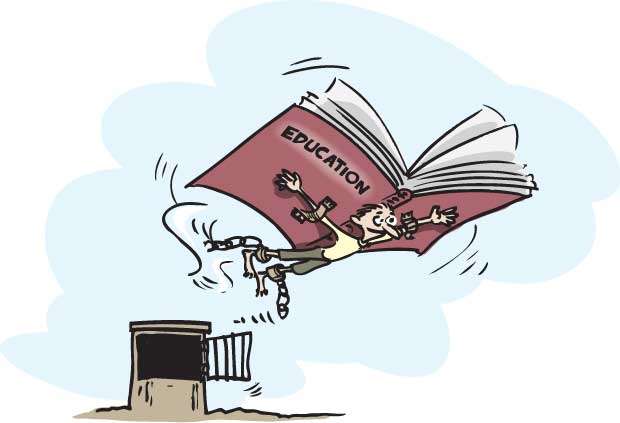Education, the best investment for a just society
10 January 2019 12:00 am Views - 1682

One of the United States’ founding fathers, statesmen and civic activists Benjamin Franklin has said an investment in knowledge pays the best interest. Albert Einstein a genius in modern science has pointed out that education is what remains after one has forgotten what one has learned in school. The radical philosopher Malcolm X also agrees that education is the passport to the future, for tomorrow belongs to those who prepare for it today while US publisher Malcolm Forbes says education’s purpose is to replace an empty mind with an open one.
With these and similar insights in mind we this month mark the first United Nations international day of education. In a statement the UN says the right to education is enshrined in article 26 of the Universal Declaration of Human Rights. The declaration calls for free and compulsory elementary education. The Convention on the Rights of the Child, adopted in 1989, goes further to stipulate that countries shall make higher education accessible to all.
Emphasizing that education is key to sustainable development the UN says when it adopted the 2030 Agenda for Sustainable Development in September 2015, the international community recognized that education is essential for the success of all 17 of its goals. Sustainable Development Goal 4, in particular, aims to ensure inclusive and equitable quality education and promote lifelong learning opportunities for all by 2030.
Outlining the challenges to achieving universal education,the UN says education offers children a ladder out of poverty and a path to a promising future. But around the world about 265 million children and adolescents do not have the opportunity to enter or complete school. More than a fifth of them are of primary school age. They are thwarted by poverty, discrimination, armed conflict, emergencies and the effects of climate change. Migration and forcible displacement also affect the achievement of the education goals, as presented in the 2019 Global Education Monitoring report.
According to the UN, by proclaiming the first International Day of Education, member states have recognized the importance of working to ensure inclusive and equitable quality education at all levels. The aim is that all people may have access to lifelong learning opportunities that help them to acquire the knowledge and skills needed to access opportunities to participate fully in society and contribute to sustainable development.
In Sri Lanka for more than 80 years, we have been blessed with the free education policy of CWW Kannangara. But after the globalized economic policies came into force, the free education policies have undergone major changes. Even in state schools education has become far too competitive with the consequences being seen in the Grade 5 scholarship examination where in most cases children are deprived of their play time and other recreation by being forced to go for tuition classes sometimes till late at night. Tuition has become a big business and some teachers do not complete the syllabus in school forcing the children to come for tuition classes. Fortunately some schools have prohibited teachers conducting tuition classes to children of their own school. For Grade five scholarships, the intense competitiveness has led to a crisis situation in the GCE ordinary level and Advanced Level examinations.
Students are taught that if they cannot pass in a fair manner they could resort to foul means and this distorts their future life in society.
Fortunately the government has introduced a new system and we hope it will work without political interference. Provisions have been made so that even those who do not obtain the necessary marks at the O/L examination could move to the A/Levels in one of a variety of vocational training areas including modern technology whereby they could proceed to higher levels or obtain productive and well paid jobs in their own rural areas. Instead of doling out charity, the provision of a house and a small property, with opportunities for well-paid jobs which will help to restore the dignity of poverty stricken families. Instead of charity they will obtain justice in society and hopefully this will lead to a gradual reduction in the poverty crisis and also give opportunities for students to get actively and creatively involved in vital areas such as the battle against global warming and climate change. Thus they will become responsible citizens who also play a role in building a multi religious and multi-racial society or unity in diversity, so that we could progress towards a just, peaceful and all inclusive society.